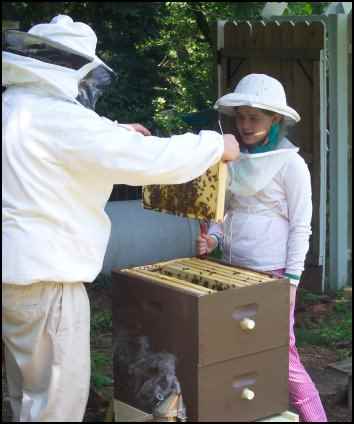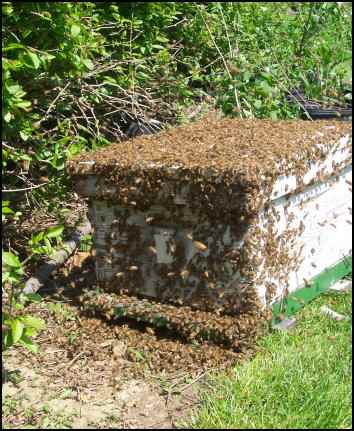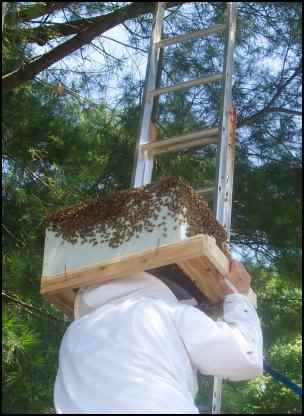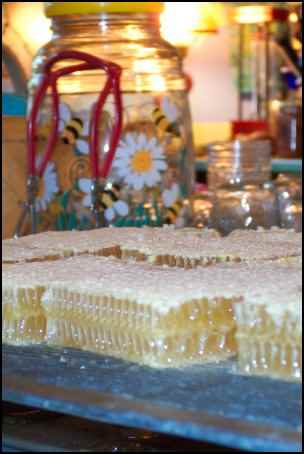“You are about to enter a whole new world,” the retired beekeeper informed me, his eyes shimmering with humor. My husband was just starting out with honeybees and was buying some used equipment from the lively fellow who willingly bestowed me with this sage prediction. Over seven years now, I have been living with a beekeeper and the old-timer was right on, it is a whole new world as a beekeeper’s wife!
“The bee is a symbol of wisdom, for as this tiny insect collects pollen from the flowers, so men may extract wisdom from the experience of daily life.” –Manly Palmer Hall
As a beekeeper’s wife, I admit, I participate as a co-dependant to my husband’s enthusiasm for these buzzing insects. Only those who love keeping bees, (and those who love their beekeepers) realize that keeping honeybees is not a hobby, it is not merely a business, nor is it just an occupation; keeping honeybees is a passionate obsession.

The whole world seems to be obsessed with bees these days. I have been informed that honeybees are second only to human beings on Internet searches. The recent Colony Collapse Disorder scare seemed to have caused the general population to realize how important bees are to our livelihood. As a beekeeper’s wife, bees are not only essential to my livelihood; they are a big part of my life. I have had bees in my living room and kitchen, in my hair and bed… and even up my skirt.
One spring afternoon I went out our kitchen door to take some scraps to the chickens when I heard the unmistakable hum of a swarm of honeybees. I looked up to see a mass of them swirling above the apiary (the place where beehives are kept). I could tell that they had not been away from their mother hive for long as they were still in the wide-open scattered stage.
I always get a thrill when I witness the fellowship of a swarm massed in the sky, numbered in the thousands, cooperating with one mind, revolving like a hurricane. For a moment I just took a deep breath and let the wonder of the swarm wash over me. They were striking out on their own, seeking to be independent of the mother hive, making their multiplying flight. It gives me the same feeling that a new birth, or the first snowdrops of spring, does. I knew that my beekeeper would want to know about our bee hurricane and that, if he could get to them in time, he might be able to entice the run-away bees to land in a hive box.
Our daughter then came running around the smokehouse corner exclaiming, “Mom! A swarm!” (If you want things to get exciting around our place, you detect a swarm.) I sent her to the black-raspberry patch where her father was picking berries. He dropped his basket when she gave him the news and hurried to where I was watching them. A few of the bees were still flying out and searching for a temporary staging spot from where they could seek their new home.
Soon they began to congregate, forming a tight little group, known as a cluster, on the overhanging branch of the white pine which stands shading our apiary from the hot afternoon sun. The cluster looked like a dark vortex hanging in the shape of an old-fashioned sugar cone. By this time my husband had located his ladder and asked me to hold it as he shimmed up and to the top of the wisteria trellis positioned beneath the pine to get closer to the bees. He placed his swarm bucket, which he carried with him, as close as he could to the swarm of bees.
I was hoping that the trellis was good and sturdy and he would not come crashing through it. I was reassuring myself with a conversation in my head, saying, “Yes, he made the trellis for the wisteria after all, and wisteria can pull down houses—which I know he realizes—and so I am sure that he made it strong!”
In the next second, any concerns that I had for my spouse as he tight-roped across the wisteria were dispelled. My worry turned to myself, as in my ear was the unmistakable song of a frantic trapped bee. Tangled in my hair her buzz rose in intensity with each passing moment as she became progressively more embedded. Everyone has heard the old saying about someone having a bee in their bonnet; I would much rather have one in my bonnet than in my hair! I imagined what it was going to feel like to be stung on the brain. I hollered up to my husband about my predicament hoping that he might have some good suggestions, or come down and help me, but he was preoccupied. He merely responded with a distracted, “I hate it when they do that,” and, “They like fuzzy stuff.”
I abandoned the ladder, and him, and flew towards the house. Flipping my hair over and upside down I hoped to shake the trapped insect out of my web of hair. I came upon our daughter and begged her to help me get this bee out of my hair as I pointed toward the spot where the buzz seemed to be inching closer and closer to my scalp. Finally, she spotted the bee and I knew at that moment that I had let her hang around that bee loving Father of hers too much when she paused to say,
“Mom, I hate to kill the poor little thing.”
“HONEY!” I exclaimed with my head of hair bobbing upside down in front of her, “WILL YOU JUST KILL THE BEE!”
Finally, comprehending my frantic state she grabbed two books and clapped them together on the section of my hair that was vibrating. “Well, you are going to have bee parts in your hair,” she tells me.
I sighed with relief when after another clang of the books the buzzing near my brain was silenced. “They only live about six months anyway,” I told my daughter, “And the last thing that I was worried about was bee parts in my hair!”
My crisis over, my thoughts once again returned to the beekeeper, and I wondered if he had made it down from the trellis. I put a bonnet (sans bee) over my head and went out to check on him. He was beaming because he had been able to shake the branch that the swarm had gathered on and had captured the queen in his bait hive. Once you have the queen, you have the swarm.

“A swarm of bees in May is worth a load of hay.
A swarm of bees in June is worth a silver spoon.
A swarm of bees in July is not worth a fly.” –May Day Proverb
What is the meaning of this old proverb? June is pushing it and July is definitely too late, as they will not be able to collect enough nectar to survive the coming winter. Beekeepers love catching swarms in early spring; doing so is both exciting and productive. I have watched my husband pull some pretty wild maneuvers to obtain one. My heart was in my throat one day as I watched while he climbed a ladder, precariously propped in the back of the pickup truck and leaning up against a tree, to retrieve the desired swarm.
Another afternoon we received a call from the local Sheriff’s office forwarding us the phone number of a family in a small nearby town who were hysterical about a swarm of bees that had settled in their yard. Most beekeepers look forward to these calls, as this is when they get to play.
Children had been busy on their bicycles spreading the word up and down the street. As we pulled up at the address, it seemed as if the whole neighborhood had come out and gathered on the lawn to witness the swarm and the coming of The Bee Man.
Later, some of the spectators related that the kids were disappointed when he arrived without a beekeeper’s suit on, as they had been told that he would come all dressed in white, with a veil over his face. But their disappointment was soon replaced with awe when my husband, unprotected, approached the swarm and seemingly charmed the raving bees into his box and carried them to his truck, like magic.
Of course, most magic tricks contain a bit of deception, but in the beekeeper’s case, it was just that he knew something about bees that the viewers were not aware of, and that is the fact that swarming bees are not aggressive because they are without a hive to protect.
My favorite part of that swarm-catching event was when a boy, of seven or so, came up to my husband as he was carrying the bees to the back of his pickup truck and politely asked if he could help. He was not as afraid of honeybees as the others because his mother had just recently acquired some hives and he was learning about them. Carrying the load that he had been assigned, he walked beside my husband and looked up at him, and exclaimed, “I am PROUD to be a Beekeeper!” My beekeeper went back home that evening musing, “Is this what life is supposed to be like? It is isn’t it!”
“To carry a grudge is like being stung to death by one bee.” –William H. Walton
I was very intimate with a very nice honeybee one day last summer. I was out behind the barn picking the first black raspberries. It was pretty wild in there with brambles above my head and weeds up to my waist. I just had to try for the big ones that I saw dangling just out of reach so I put my foot up on an old fence I thought would support me. But it broke, causing me to do the splits across the brambles. I had a skirt on and I guess that must have been when the hitchhiker got in.
Slowly, I got myself up out of my predicament, finished up in the patch, and started towards the cherry tree to see if there was anything ripe there. I felt something itch so I opened up and shook, you know how you do, figured I knocked it off of me, whatever it was, and went on to the cherry tree when I felt something on my butt cheek.
With my mind on picking cherries, I absentmindedly reached behind and patted my skirt where the bump was. I was thinking, “What in the world?” I figured it was another pair of underwear getting bunched up, losing the elastic and I would have to throw them away. No wait, this bump was moving around on the inside of my underwear! I reached up under my skirt, plucked whatever it was and pulled it out. Soft and fuzzy in my hand, was it a caterpillar? No, a bee sat there and looked at me for one dazzled moment before it flew away to go on about its business. Perhaps it was a drone or a queen, as thankfully, it did not sting me!
“In general, bees have been thought of as messengers of the spirits.” –Thomas D. Worrel, The Symbolism and the Bee and the Beehive
Recently, I was conversing with a lady who said that they now had honeybees in their yard because a swarm had landed there. They called a beekeeper to come out who brought them a super hive box for the bees to move into. She mentioned that it felt like a blessing with all the bees of the world disappearing, and here they just had a hive move right into their yard. This made me chuckle inside as I was remembering all the frantic calls that my husband and fellow beekeepers have received through the years from people who were freaking out because they had bees in their yards.
Could it be that the threat of Colony Collapse Disorder is what it took to make people appreciate bees? Instead of considering all flying creatures a nuisance perhaps now we will stop and wonder, before we swat or spray, just what are we destroying. It seems that humans only think that something matters if it directly affects us. Protected in our artificial bubbles with our central air and water purifiers, being entertained by our televisions, we hardly notice nature. We think that we can take away all the habitats of the wild things and spray toxic chemicals everywhere then we wonder, “What is happening to the bees and is it true that if they die we will die?”
Perhaps now, we will wake up to the fact that we are all connected in a delicate web of life; I am grateful for the threat of Colony Collapse Disorder if it caused this to happen. There is some speculation that Colony Collapse Disorder is not even real. Scientists say there is no proof that the mysterious disease blamed for the deaths of billions of bees actually exists. You can read about it here in an article on BBC News.
Yet the fact remains bees are being affected by something.
“The beehive is found in Masonry as a reminder that in diligence and labor for a common good, true happiness and prosperity are found.” –Manly Palmer Hall

I believe that some of the appeal of keeping honeybees is that a lot about them is still a mystery. Sometimes we can only wonder at their ways. When my husband was the County Apiary Inspector, I went along with him into the field as he went to investigate an apiary that had been neglected because the owner had become ill.
My beekeeper was somber as he approached the hive and saw what he had dreaded, no activity. Honeybees were not flying in and out of the passageways, so, without bothering to put on his veil, he lifted the lid on one of the boxes. Gravely he asked me if I wanted to see their last emotion. I said, “What do you mean?” He then showed me how the bees in the center had perished looking for food, with their heads buried deep in the cells that had run out of honey. The outer bees remained at their stations where they had been keeping the hive warm. Not one of them was out of position, each still attended to her duty right up until the moment of death.
“’Well,’ said Pooh, ‘what I like best— ‘ and then he had to stop and think. Because although Eating Honey was a very good thing to do, there was a moment just before you began to eat it which was better than when you were, but he didn’t know what it was called.” –A.A.Milne
While there are a few things that I don’t enjoy about being married to a beekeeper, like the threat of getting stung, having bees everywhere—even in my hair and underwear—there are many things that I love about it. For one thing, my husband is doing something that he has a passion for; he believes in what he is doing and he is contributing something worthwhile to the world… and I love honeycomb. Early every summer I start craving my first taste of our new crop of that golden ambrosia, honey still encased in the structure that the honeybees stored it in. I have given it another name: I call the little glistening squares of honeycomb, honeycakes.
My husband tells me that when there are a lot of blooms and the weather is warm and dry, this makes for a good bee-run. During times like this, it is easier for the bees to make wax and they can make it fast. The faster the wax is produced, the more tender is the honeycomb; he compares it to eating sweet corn, fresh.
make wax and they can make it fast. The faster the wax is produced, the more tender is the honeycomb; he compares it to eating sweet corn, fresh.
All in all, I have found the retired beekeeper to be correct in his prediction. It has been a whole new world for me, one filled with both good and bad, but all very interesting.
If you are interested in keeping bees you can contact your County Agricultural Extension Office for information about local beekeepers and bee-keeping associations. Honey Bees and Beekeeping is a great website, full of information about honeybees and getting started with them.
“I think these are the wrong sort of bees.” –Pooh, The Honeybee Tree by A.A. Milne
Often my husband will get calls from people who think that they have honeybees in their yard when it is really wasps or hornets. These flying insects cause much of the bad reputation that bees have to live with. Bee Culture Magazine has a great online, printable page which illustrates the different nests of stinging insects with great drawings of the specimens themselves. Paper wasps, bald-faced hornets, bumblebees, carpenter bees, yellow jackets and finally, honeybees adorn this colorful page for those who would like to touch upon their knowledge. It comes in color but I love printing this page out in black and white and letting the children color it in as a fun way to teach them about the different kinds of bees.










